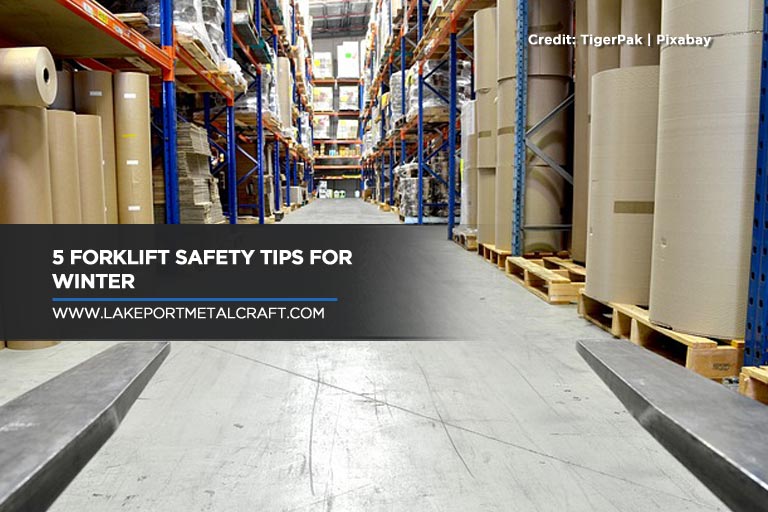The winter season is quite a busy time for forklift operators. Warehouses are abuzz with activity as items are continuously being loaded and unloaded onto delivery trucks and storage racks to fulfil orders in time for the Black Friday, the Christmas shopping rush and post-Christmas sales.
However, it is also a fact that working during winter can be quite hazardous. Frigid temperatures have debilitating effects on forklift drivers’ health, making them prone to losing focus on the job. Furthermore, the cold can also negatively affect a lift truck’s components, causing it to malfunction. All of these can lead to accidents that can result in injuries or even fatalities.
As an employer, it is your job to ensure that your forklift operators can safely work during this cold season. Therefore there is a need to implement proper forklift safety standards, procedures, and rules for the winter.
What Is Cold Stress?
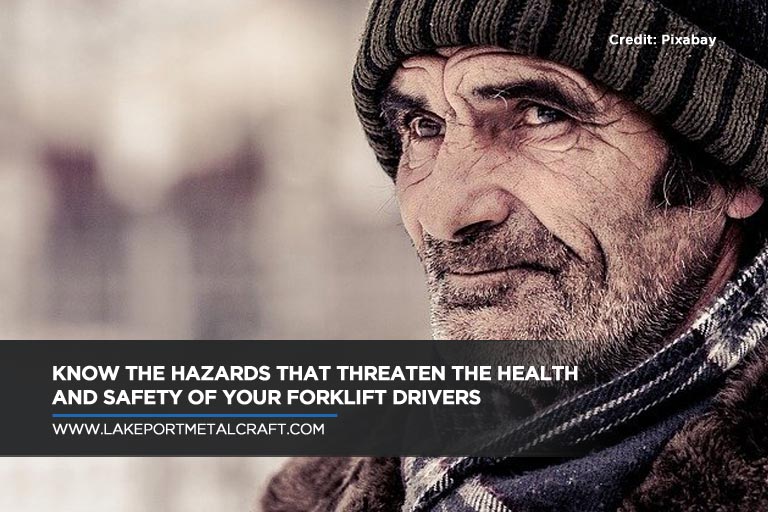
Winter can bring all sorts of risks that can make a forklift operator’s life difficult in the workplace, especially for those that are assigned to work outdoors. For their own safety, drivers should always be wary of these hazards:
- Sudden snowfall or rain
- Wet or slippery floors
- Strong cold winds
- Limited visibility, especially at night
For forklift operators working near the loading dock or outside the logistics facility, they are openly exposed to the cold winter air. Due to this, they have a high risk of cold stress, a condition wherein the body can no longer maintain heat. When this happens, the temperature of the skin and body will drop significantly.
Cold stress can lead to several illnesses and injuries that can permanently damage the body when left untreated:
- Hypothermia
- Frostbite
- Trench Foot
- Chilblains
- Cold Shock
What Can Forklift Operators Do to Stay Safe During the Winter?
Keeping your forklift drivers warm while working in frigid temperatures requires proper planning and execution. Furthermore, all hydraulic lifts must be outfitted to handle the cold as well to reduce any chance of malfunction or breakdowns that can compromise the safety of their operators.
To ensure your employees are protected front the cold, be sure to follow these effective forklift safety tips:
1.Conduct Forklift Winter Safety Training
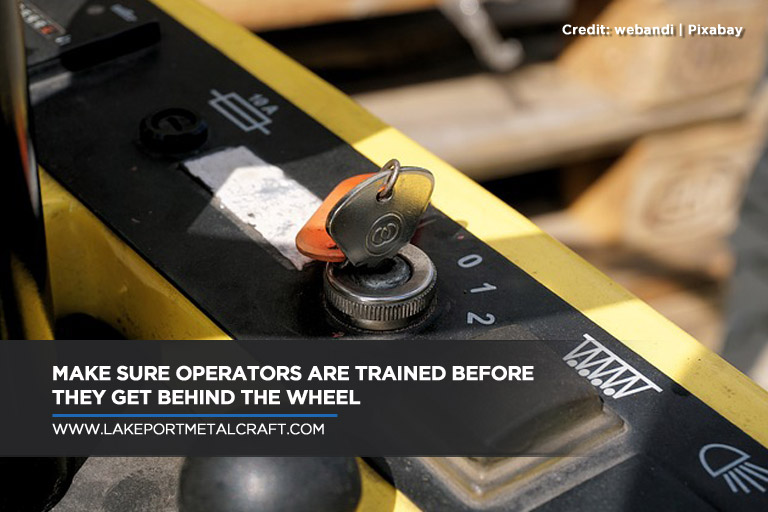
As part of proper forklift operator safety measures, adequate training must be given to drivers. This will help them to be better prepared to handle working conditions at low temperatures and avoid winter-related accidents. In addition, the training will also give the operators sufficient knowledge of cold-induced illnesses and injuries as well as the means to properly treat them.
Consider training your forklift operators on the following winter safety topics:
- Safety awareness for forklift equipment during winter
- Recognizing the symptoms of cold-induced illnesses and administering proper first aid.
- Proper physical conditioning.
- Selecting the appropriate winter gear and clothing.
- Awareness of environmental hazards in the workplace.
- Company Winter Safety protocols.
2.Provide Operators With Appropriate Winter Safety Gear
As part of your company’s forklift operator safety checklist, drivers need to wear the appropriate winter gear to protect them from strong winds and rain especially if they are assigned to outdoor tasks.
Operators can be supplied with the following safety gear whenever necessary:
- Insulated Winter Safety Gloves and Boots
Insulated winter gloves and boots specifically designed to trap thermal energy from the air to keep your operator’s hands and feet warm and protect them from the elements.
- Winter Goggles
These specialized googles are fog-resistant and help protect the driver’s eyes from the cold winds, water droplets and snow.
- Insulated Winter Work Jackets and Pants
Both the jacket and pants work together to provide full-body protection against cold winds and rain. Since they are insulated, they help your forklift operators stay warm and dry on cold days.
When choosing your equipment, make sure that they come with these safety and utility features that can be of great benefit to your forklift operators:
-
- Bright colours with reflective tape for increased visibility
- Pockets for storage
- Hard Hat Liners
Hard Hats provide good protection against impacts and falling debris, but they don’t do much when it comes to the cold. Make sure you supply winter liners to your forklift drivers to help keep their heads warm during winter.
3.Winterize Your Forklifts
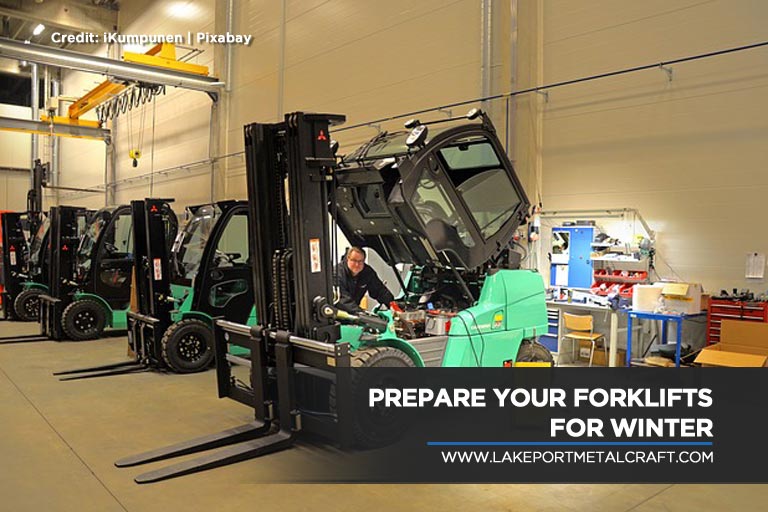
Cold temperatures have adverse effects on a machine’s components resulting in breakdowns and system malfunction. These situations can place an operator’s life at risk since their machines are carrying heavy loads and operating in a work environment where one might encounter falling debris and collisions.
To reduce the number of unexpected breakdowns, forklifts must be fully prepared and equipped to handle winter operations. Before winter even starts, it is important for operators to perform these safety checks:
- Perform detailed inspections, especially on forklift safety systems.
- Give hydraulic lifts a proper tune-up.
- Make necessary repairs or replacements.
In addition to the safety checks, operators should pay attention to these key areas and perform the necessary maintenance when needed:
- The Battery
Frigid temperatures can be extremely rough on batteries, making them discharge faster than normal. To prevent this from happening, it is necessary to regularly test the battery with a load tester to ensure it’s close to maximum strength and charge it when necessary. - The Cooling System
Water in the cooling system tends to freeze up in sub-zero temperatures and this usually results in engine failure. It is highly recommended that you use antifreeze in the coolant lines to prevent this. - The Tires
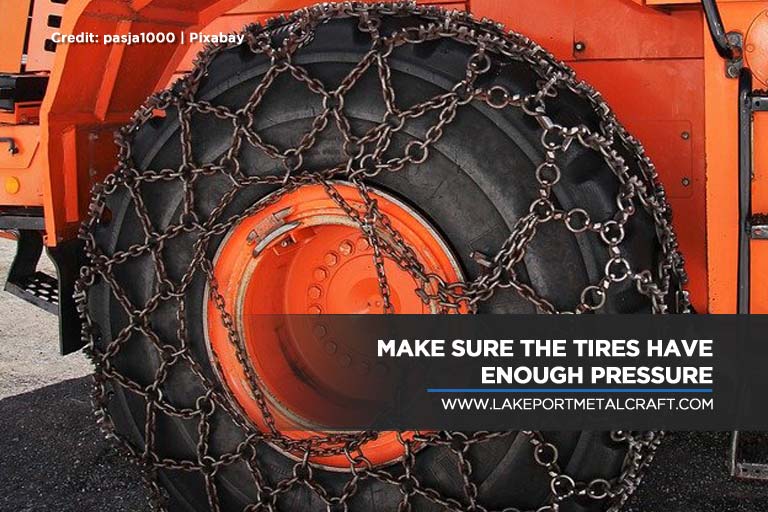
Have your drivers do a routine check on the tire pressure of each forklift in your fleet. Cold temperatures often cause the PSI to drop, so it’s important to inflate your tires back to the optimal pressure levels.
In addition, it’s also crucial to wrap tires with specialized forklift tire chains to provide extra grip when running on snow-covered surfaces.
- The Lights
Having working lights on a forklift is necessary for increased visibility during nighttime operations. Make sure that all the lights on the machine are fully functional.
Furthermore, if your lift truck still uses halogen lighting, upgrade it to LED ones. These last longer and are not affected by freezing temperatures.
- The Hydraulics
Frigid winter temperatures can cause hydraulics and moving parts to stiffen and freeze up. To prevent this, always remember to keep them properly lubricated.
4.Allow Forklifts to Warm up Before Operations
Operators should set aside a few extra minutes to allow the forklift engines and hydraulics to properly warm-up before using. This will allow the oil to circulate and prevent combustion and transmission-related problems from occurring.
5.Clear the Ice From Work Areas
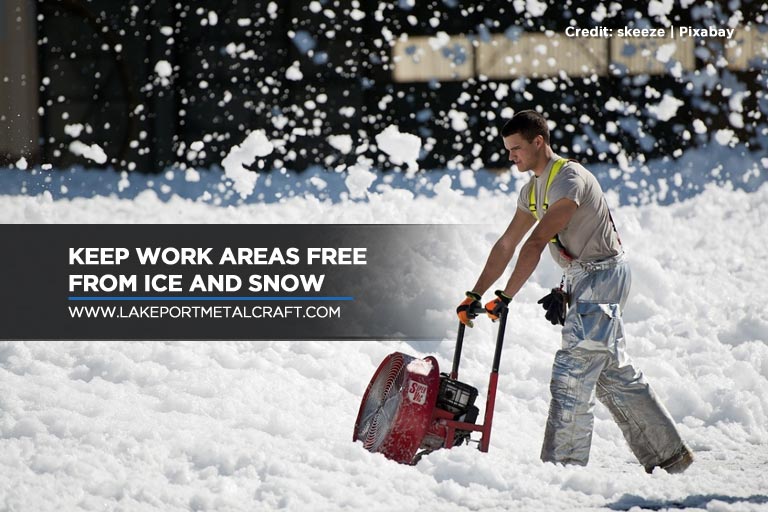
Most winter-related accidents are usually caused by slips and trips on ice or snow-covered surfaces. To reduce the risk of that happening, hazardous areas must be properly identified and have the issues addressed as soon as possible:
- Remove any snow, ice or other hazards from entrances, car parks, pedestrian walkways, sloped areas, and other areas with a high degree of foot traffic.
- Rock salt or other de-icers must be sprinkled on icy surfaces.
- Use temporary signs, cones, barricades or floor stands to warn pedestrians about hazardous areas.
Operating a forklift during the winter can be dangerous for operators – unless precautions are taken. By following the safety tips mentioned above, you will be able to reduce the risk of your drivers getting injured while on the job.
In addition to winter safety, you also have to take into consideration everyday hazards like forklift under-ride. To ensure the well-being of your forklift operators and reduce the risk of under-ride accidents, call Lakeport Metalcraft Inc. for The Backbone® at 416-587-5809 or email n.nopper@LakeportMetalcraft.com.

